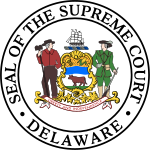Smith v. Van Gorkom
| Smith v. Van Gorkom | |
|---|---|
 |
|
| Court | Supreme Court of Delaware |
| Full case name | Alden Smith and John W. Gosselin v. Jerome W. Van Gorkom, Bruce S. Chelberg, William B. Johnson, Joseph B. Lanterman, Graham J. Morgan, Thomas P. O'Boyle, W. Allen Wallis, Sidney H. Bonser, William D. Browder, Trans Union Corporation, a Delaware corporation, Marmon Group, Inc., a Delaware corporation, GL Corporation, a Delaware corporation, and New T. Co., a Delaware corporation |
| Decided | January 29, 1985 |
| Citation(s) | 488 A.2d 858 (Del. 1985) |
| Case opinions | |
|
Majority: Horsey Dissent: McNeilly Dissent: Christie |
|
| Court membership | |
| Judge(s) sitting | Daniel L. Herrmann, John J. McNeilly, Jr., Henry R. Horsey, Andrew G.T. Moore II, Andrew D. Christie |
Smith v. Van Gorkom 488 A.2d 858 (Del. 1985) is a United States corporate law case of the Delaware Supreme Court, discussing a director's duty of care. It is often called the "Trans Union case".
The case involved a proposed leveraged buy-out merger of TransUnion by Marmon Group which was controlled by Jay Pritzker. Defendant Jerome W. Van Gorkom, who was the TransUnion's chairman and CEO, chose a proposed price of $55 without consultation with outside financial experts. He only consulted with the company's CFO, and that consultation was to determine a per share price that would work for a leveraged buyout. Van Gorkom and the CFO did not determine an actual total value of the company. The court was highly critical of this decision, writing that "the record is devoid of any competent evidence that $55 represented the per share intrinsic value of the Company."
The proposed merger was subject to Board approval. At the Board meeting, a number of items were not disclosed, including the problematic methodology that Van Gorkom used to arrive at the proposed price. Also, previous objections by management were not discussed. The Board approved the proposal.
The Court found that the directors were grossly negligent, because they quickly approved the merger without substantial inquiry or any expert advice. For this reason, the board of directors breached the duty of care that it owed to the corporation's shareholders. As such, the protection of the business judgment rule was unavailable.
The Court stated,
The rule itself "is a presumption that in making a business decision, the directors of a corporation acted on an informed basis, in good faith and in the honest belief that the action taken was in the best interests of the company." ... Thus, the party attacking a board decision as uninformed must rebut the presumption that its business judgment was an informed one.
488 A.2d at 872. Furthermore, the court rejected defendant's argument that the substantial premium paid over the market price indicated that it was a good deal. In so doing, the court noted the irony that the board stated that the decision to accept the offer was based on their expertise, while at the same time asserting that it was proper because the price offered was a large premium above market value.
...
Wikipedia
